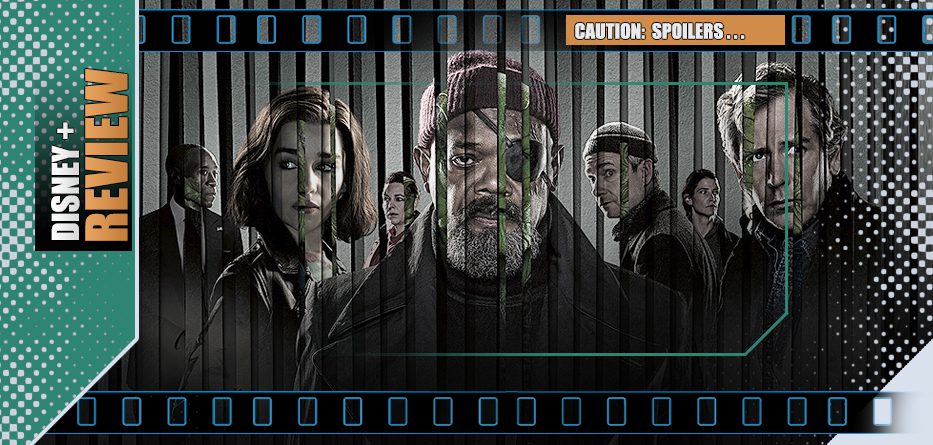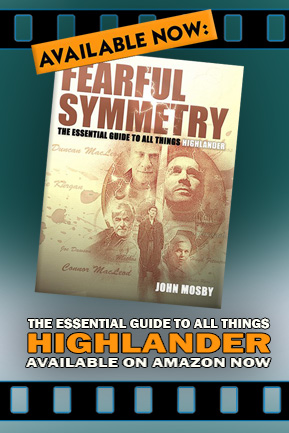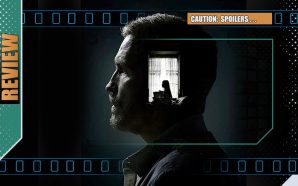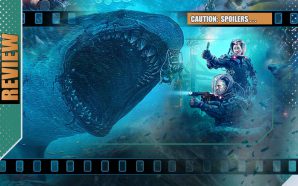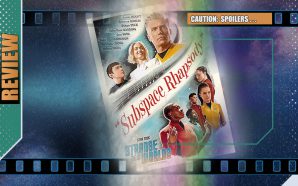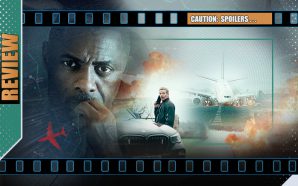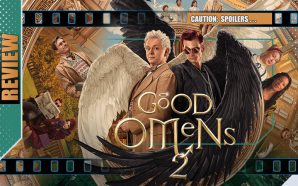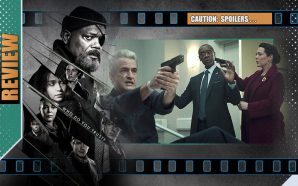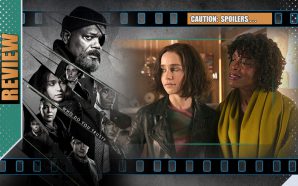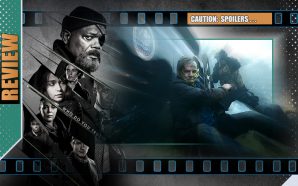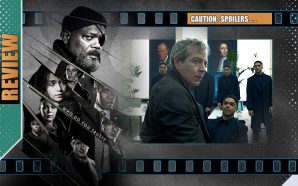It’s been three decades since Nick Fury and Carol Danvers promised refugee Skrulls that they would find them another home and gave them a temporary sanctuary on Earth. But in that time, Fury and Danvers have had to face other dangers, their roles waxing and waning as they are faced with literal universe-saving conflicts. But all that time Skrulls have been made to hide and now some of them are beginning to resent their second-class status in a world that restricts their movements and denies their very existence.
Now, some of the Earth’s security-forces are beginning to spot patterns in various terrorist events, something that suggests a deniable level of co-ordination and which – if true – could affect the history of humanity. A faction of Skrulls are making their way from refugee-status to positions of influence, their shape-shifting abilities carefully breeding trust and distrust and laying the world-stage for something terrible. Talos and Maria Hill summon Nick Fury back to Earth in the hope of stemming the tide, stopping the terrorist threat and perhaps finally fulfilling that decades-old promise in a more peaceful way.
But whom can a weathered and conflicted Fury trust… and what will be the cost if you can’t believe what you see in the mirror?
*spoilers*
Truth may be stranger than fiction, but recent fiction has done its level best to be relevant. All good fiction echoes the world in which it is created, picking up themes, concerns and ideas and hopefully grafting a compelling set of characters into its story. Marvel – as both a comics business and a screen empire – has long established its ability to reflect that. So, the fictional, cosmic refugee factor at the heart of Secret Invasion (a series very much about imperfect consequences and aftermaths) is not a subtle analogy – one only has to turn on the real-world television news to find stories of displaced people, conflict zones, historical frustrations and distrust on all sides leading to socio-political frustrations and violence. But though it’s timely, there are problems within the MCU that both fuel and muddy the theme. We know that the seed of these events is the fact that peaceful Skrulls arrived over thirty years ago (seen in the Captain Marvel feature) and were assured by Nick Fury and Carol Danvers that every effort would be made to find them a home – their stay on Earth supposedly nothing more than a stop-gap while those efforts were made. Three decades is a long time and it seems, despite the MCU going positively cosmic, there’s been no progress (which is a little hard to believe). Skrulls are still here but have to remain hidden from society… it’s not entirely clear how their presence is tolerated and policed by the worlds’ super-powers: There’s talk of secretly monitoring and tracking them, but it seems like spy-craft rather than any official diplomacy and some security-agencies seem better informed than others. Did the original Skrulls or Humans agree to ‘quarantine’ the (apparently growing) population in radiation-high zones and prevent the shape-shifters from literally blending back into society? (It seems that leader Gravik completely controls who goes in and out of the Russian enclave and sent on missions). To be fair, the Skrulls have a point in their frustration: a melancholy and weathered Fury appears to have confined himself to an orbiting space platform dealing with his fractured feelings about the five-year ‘Blip’ and there’s no real mention of Danvers’ efforts being discussed (and, again, that seems to be something she’d see as a priority). One also has to remember that the MCU has already willingly and without fanfare found a place on Earth for the displaced Asgardians that’s far from a secret – it’s even a tourist-attraction. In short, the Skrulls – perhaps perceived as a threat because of their very shape-shifting abilities have become a self-fulfilling prophecy as a militant and cultural time-bomb, the perceived black-sheep of a more photogenic family.
Marvel have had something of a Samuel L. Jackson problem for a while. The enigmatic, non-nonsense cornerstone to the first phase of their plans and the kind of character and actor that can still hold his own in a room otherwise full of hammers, shields and latex, the MCU hasn’t really known what to do with Nick Fury since Avengers: Endgame. Secret Invasion may be about infiltration, but it’s also an opportunity to explore what happens to old soldiers who’ve seen too much and yet feel they’ve done too little. On the printed pages of the comics, specifically the mature-audiences MAX version, a whoring and almost mercenary and militant Fury bemoaned peace-time boredom and admitted he needed another war (the issues of the comic were so dark and nihilistic that some creators bristled at the version of the character and it allegedly led George Clooney to later drop out of negotiations with Marvel to play the original grizzled Caucasian version of the character on screen). The MAX comics came out in 2001 and mere weeks before 9/11 made everyone take a breath. Here, the MCU‘s Fury is not so much looking for a fight as realising him limitations. But though there’s danger and tragedy swirling around him, there’s undeniably a sense that this is Nick Fury back in his element – back Earth-side and streetwise and dealing with a threat for which he can’t summon in the ‘big guys’ lest they become compromised themselves.
Like Nick Fury, I may have been gone a while, but it’s a little disconcerting to see my native Yorkshire acting as a Marvel backdrop: Halifax Piece Hall being turned into a urban Russian war-zone and the back-streets of Leeds becoming downtown Moscow.
The fictional, cosmic refugee factor is not a subtle analogy – one only has to turn on the real-world television news to find stories of displaced people, conflict zones, historical frustrations and distrust on all sides leading to socio-political frustrations and violence. …
Secret Invasion and its slower ‘Smiley’s People meets Invasion of the Body Snatchers‘ vibe needs to establish the cultural peril and active distrust beyond mere explosions and set-pieces and so we shouldn’t be shocked when there’s an early casualty amongst the established cast to underline those stakes. It’s a surprise that it’s Colbie Smulder’s Maria Hill that literally takes the bullet (felled by Gravik in Fury’s image and creating a genuinely emotive look of shock and confusion as Hill dies in the real Nick’s arms moments later). It’s effective, but it also smacks of classic ‘fridging’ in which a female character is killed to motivate a male character’s mission. The implications of that death will be addressed in the second episode, but it will be important that the demise isn’t treated as just punctuation if it’s to be perceived as an imperative to the story. That being said, the series’ more sleek six-episode format should hopefully balance out the story-padding seen in longer Marvel / Disney+ entries.
Ben Mendelsohn is that kind of classic Australian actor who can put across menace and humour with a look and an inflection and here that optimum pitch voice deserves star-billing – able to show his friendly Skrull Talos be a distraught father and widower in one scene, an anguished father the next and yet trade casual fraternal snark with Fury the next. Emilia Clarke, late of being the Mother of Dragons in Game of Thrones has a more supportive role in Secret Invasion but as Talos’ daughter G’iah she’s something of the lynchpin on which the show is likely turn – a character hurt, dangerous and rebelling but not yet completely lost to darker impulses. Olivia Colman, as Fury’s equally-capable opposite MI6 commander Sonya Falsworth… (and there’s a surname die-hard Marvel fans may take as a legacy easter-egg with complications) is always a delight to watch and her verbal-jousting with Fury is one of the highlights of the opener in a scene where showrunner Kyle Bradstreet (Mr. Robot) and director Ali Selim know they can leave it to the A-Gamers to deliver. The first episode gives us Kingsley Ben-Adir’s Gravik as a ruthless leader and terrorist but there’s very little to go on thus far – such a role requires some charisma and nuance and we’ve only seen him hammering out orders and causing chaos. Hopefully we’ll get to see more of his character and characteristics soon, though there are hints there are other people pulling the strings far higher up. Elsewhere Martin Freeman appears at the start, gives some exposition to newcomers and then – really not a surprise – turns out to be more/less than he appears…
The MCU has strived to fit a vast array of styles and tonally-different stories under its umbrella, some more successfully than others. But many have dealt with conflict – both the family and the global kind – and never more so than here. Marvel/Disney‘s The Falcon and the Winter Soldier flirted with such nuanced socio-political themes but then deferred to more basic action and one hopes that Secret Invasion can tinker and tailor its blueprint to avoid some of those pitfalls and fulfil some of its early promise…
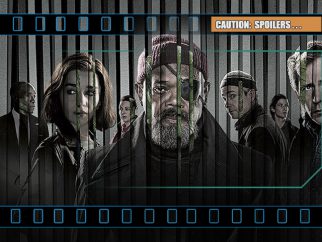
- Story9
- Acting8
- Direction9
- Production Design / VFX9

